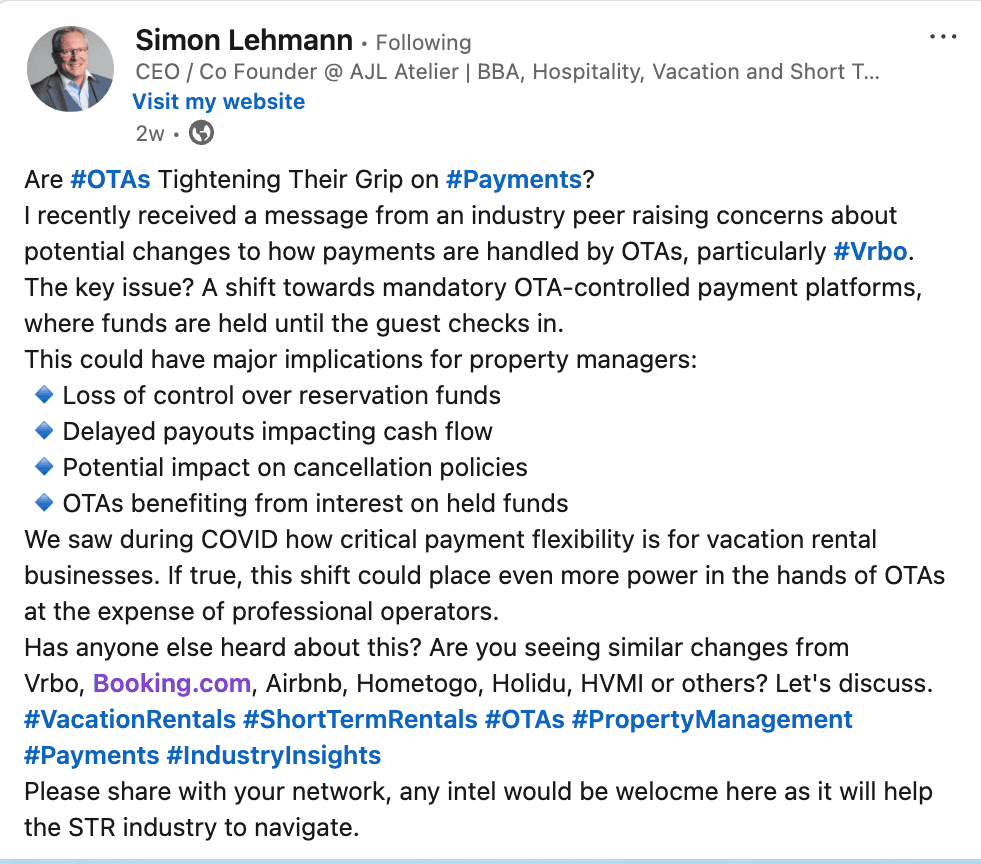Booking.com closed 2024 strong, with alternative accommodations—short-term rentals included—up 19% YoY, now making up 33% of its total room nights.
But that’s not all that’s growing. Merchant gross bookings—where Booking.com collects guest payments and pays hosts later—now account for 59% of total bookings, up 9 percentage points YoY.
Great for Booking.com. Not so great for property managers. While some welcome the security and automation, others warn of lost control over payouts, tighter OTA policies, and more platform dependence.
So, where does this leave short-term rental professionals? More demand, but on whose terms? Let’s break down the numbers, Booking.com’s strategy, and what it means for you in 2025.
Alternative Accommodations Are Booming on Booking.com
With listings and bookings climbing fast, STRs are now a core part of the platform’s strategy.
Booking.com isn’t just growing in short-term rentals—it’s thriving. The company’s Q4 2024 performance showed significant momentum in alternative accommodations, including vacation rentals, apartments, and other non-hotel stays.
Here are the key numbers:
- 19% year-over-year (YoY) growth in alternative accommodation room nights, up from 14% in Q3.
- 33% of all Booking.com room nights in Q4 came from alternative accommodations.
- 7.9 million listings, an 8% YoY increase in supply.
This growth isn’t just happening in one region. In Europe, where Booking.com leads with a 48% market share, alternative accommodations continue to thrive. In the U.S., where the platform holds only 8% market share, its push into urban short-term rentals is gaining traction.
Got it! Let’s make it more fluid and engaging while still keeping the distinction clear. Here’s how we can present it:
Why Is Booking.com Winning in Short-Term Rentals?
Booking.com attributes its success in alternative accommodations to several key initiatives—from expanding its Connected Trip strategy to strengthening its Merchant Model and Genius loyalty program. But beyond what the company highlights, there are also structural advantages baked into its platform that make it well-positioned to grow in STRs.
What Booking.com Says Is Driving Its STR Growth
✔ Connected Trip Strategy → By encouraging travelers to book flights, car rentals, and accommodations together, Booking.com increases the likelihood of guests choosing an STR stay—especially in destinations where vacation rentals are common.
✔ Strengthening the Merchant Model → More guests are paying Booking.com directly, streamlining transactions and potentially improving conversion rates for hosts.
✔ Dominance in Europe → With 48% market share in Europe, where alternative accommodations are already well integrated into Booking.com’s ecosystem, STRs continue to thrive.
✔ Genius Loyalty Program → Higher-tier Genius members book more frequently and are more likely to book direct, strengthening repeat bookings for STRs on the platform.
✔ Tools & Support for Hosts → Booking.com has invested in host-focused features like Payments by Booking.com and the Pulse app.
What Else Gives Booking.com an Edge?
Hotel + STR Hybrid Approach
One of Booking.com’s biggest advantages over competitors like Airbnb and Vrbo is its ability to blend hotels and short-term rentals into a single search experience. Unlike Airbnb, which keeps STRs as the primary focus, Booking.com presents vacation rentals side-by-side with hotels, exposing them to travelers who might not have originally considered an STR stay.
✔ More Exposure for STRs → A traveler looking for a hotel in a major city might see a short-term rental as a top option instead. This opens up STR bookings to a much broader audience beyond traditional vacation rental travelers.
✔ A Built-In Trust Factor → Many travelers already associate Booking.com with hotels, which are perceived as more standardized and reliable. By integrating STRs into this mix, Booking.com benefits from its existing reputation, giving hesitant travelers more confidence to book a short-term rental.
For STR managers, this means potentially reaching travelers who wouldn’t have otherwise considered booking a vacation rental—especially in urban markets.
A Strong Pitch to Professional Hosts—A Contrast to Airbnb’s Approach
While Airbnb has doubled down on attracting individual and occasional hosts, Booking.com is making a clear play for professional short-term rental operators.
How Booking.com’s Strategy Differs from Airbnb
- Spotlighting Property Managers → Unlike Airbnb, which emphasizes individual host stories, Booking.com highlights property management companies like Evolve, signaling a focus on scaling supply through professional operators.
- STR as a Business, Not a Side Hustle → Airbnb positions hosting as something anyone can do, while Booking.com appeals to full-time managers with pricing tools, payment handling, and minimal guest engagement.
- A Hands-Off, Hotel-Like Model → Instant bookings, OTA-managed payments, and automated operations make it easier for managers to scale without direct guest involvement.
This stands in contrast to Airbnb’s push toward more individual and part-time hosts, as reflected in:
- The Co-Host network, which helps small-scale hosts find co-hosts rather than onboarding professional operators.
- Recent marketing campaigns, which emphasize renting out spare rooms and personal homes.
- CEO Brian Chesky’s repeated statements about Airbnb’s “return to home sharing.”
For STR managers listing on both platforms, the contrast between Airbnb’s focus on individuals and Booking.com’s focus on professionalized STRs reinforces the need for a diversified listing strategy.
The Merchant Model: More Convenience for Guests, Less Control for Hosts
Booking.com isn’t just reshaping short-term rental supply—it’s changing how money moves through its platform.
- 59% of Booking.com’s gross bookings now run through the Merchant Model, up 9 percentage points YoY.
- Under this system, Booking.com collects guest payments at the time of booking and pays hosts after check-in.
This shift improves guest experience, reduces fraud risk, and increases Booking.com’s financial control. But for property managers, it’s a complex issue.

Industry expert Simon Lehmann raised concerns about OTAs tightening their grip on payments, sparking debate among STR professionals. Some, like Michael Chang (Trustbnb), argue that OTA-controlled payments improve security, while others, like Chris Maughan (I-PRAC), warn of longer payout delays and lost financial independence.
Booking.com’s Antom partnership, announced in January 2025, strengthens this model by expanding localized payment options across key APAC markets, further reinforcing OTA-controlled transactions.
What This Means for STR Managers
- If you rely on fast payouts, the Merchant Model could disrupt cash flow.
- If fraud protection is a priority, this model could work in your favor.
- If direct bookings matter, relying on OTA-controlled payments could limit guest retention.
What This Means for Short-Term Rental Managers in 2025
Booking.com’s success in STRs brings new opportunities—but also more competition and platform dependence.
- More supply = more competition. Listings are growing, making pricing optimization and strong guest experiences more critical than ever.
- OTA-controlled payments are expanding. The Antom partnership signals Booking.com’s long-term commitment to controlling transactions.
- Urban STRs will be a major battleground. With Airbnb leading in U.S. cities, Booking.com is aggressively expanding into urban rentals.
Final Takeaway: Growth, Control, and Critical Decisions for STR Managers
For STR professionals, 2025 will be a year of key decisions.
- Lean into Booking.com’s growth, or diversify to maintain control?
- Accept OTA-managed payments for security, or push for financial independence?
- Compete in an expanding STR ecosystem, or invest more in direct channels?
The industry is shifting fast. How you adapt will define your success.








